Changing Lives In Xiao Shaba “New Village”, Yunnan Province
/By Zhong Mei, MK31 Fellow
Faced with a large and ever-expanding population, China’s employment issue has been a growing concern for the country and its people. With a plethora of ethnic minorities, Yunnan province has been strongly impacted in terms of employment due to the growing population, economy, and new policies. In addition, disparities between men and women have prominently widened amidst overall unemployment concerns. My research focuses on Liuku Town, Nujiang Lisu Autonomous Prefecture of Yunnan Province, and aims to uncover and analyze employment differences between men and women in a resettlement area village called Xiao Shaba that has been built for the planned Liuku hydropower project.
Liuku Town hosts the seat of Nujiang Prefecture’s government, and is located across the Gaoligong Mountains, East of Myanmar, South of Lu Zhang Town, and North of Shangjiang Township. The town is surrounded by high mountains, deep valleys, and steep ravines.
I took a fieldtrip to Liuku Town for a week during the end of September 2015. As it was my first time there, I had spent a lot of time imagining the scenery: mountains all around, barren fields, pot-holed roads, and so on. To my surprise, along the way to Liuku, the mountains are crossed by highways, which can’t even really be called “highways” because of the limited speed with which the vehicles were moving. Almost all roads are built around the hills, while Bridge-Roads and elevated highways are a common sight.
“Nujiang valley” is located in Liuku town.
Although the project to build Liuku hydropower station has been around for a while, its actual construction has been continuously delayed for various reasons. This was the typical answer given by multiple relevant government staff with whom I had the opportunity to talk to.
Far away from Liuku town, the village of Xiao Shaba “New Village” is located on a hill along Nujiang, and is the hydropower project’s reservoir resettlement area. Construction started in 2006, and in 2007 a total of 114 households and 477 people moved to the New Village. This New Village is located alongside the Nujiang River near Liuku Town, and appears to have good infrastructure facilities.
Before they started building this New Village, the local government introduced a policy to create a “materials market” there, in order to provide employment for the local workforce. I visited the materials market to gather information about the employment situation. On the side of the road was a group of people with a lot of women working on DIY (do-it-yourself) products and handicrafts while chatting with other people.
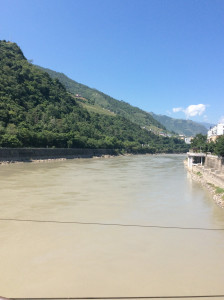
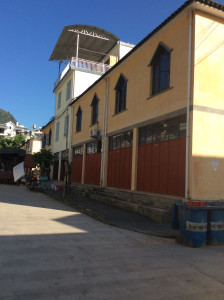
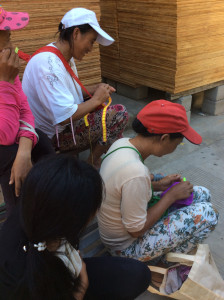
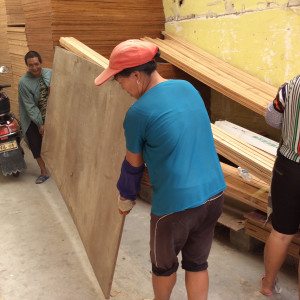
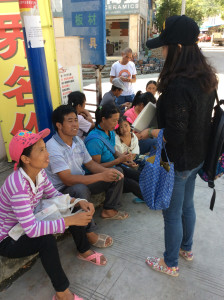
Talking to a fifty year-old woman whom I met, she said that most of the female workers at the Materials Market are from the New Village. They are mostly engaged in portering, and only a few of them need to seek jobs beyond this village. She also told me that she did not live in the New Village, but in a village located on a hill far away. Her village is nearby to old Xiao Shaba village, but isn’t directly involved in the resettlement project. She has to walk two hours’ worth of mountain roads to reach this market every day, in order to earn some money and be able to put some food on the table for lunch. She told me that people in her situation typically earn between 50 Yuan to 80 Yuan per day if there are jobs available for them in the New Village. In addition to that, these women can earn some money from selling their handicrafts.
When I arrived at first, the villagers were not keen on answering my questions. But, as I explained to them that I am a student of Yunnan University, was there for a field trip, and after I spent time with them they began to trust me. During the visits to the New Village, I discovered that many of the people had a very positive attitude towards this resettlement project in general due to improvements in livelihood, as well as the road access and traffic conditions. When they moved to this new village, they gained some benefits in terms of employment, but also lost something. In the past, they did agriculture because they had some lands to plant. And now, these lands have been planned to build hydropower station, so they have to find another way to feed their lives. But, based on my discussions with them and my observations, I believe they are still hoping for further change, for their needs to be fulfilled, and their lives to improve. They want to be given more employment opportunities, more income, various allowances, etc.
Nowadays, more and more people are concerned with mitigating gender-related issues, especially with regards to employment disparities between men and women, and this is also the focus of my fellowship research. The issue of gender inequality in employment can be addressed by employment policies, as well as education and skills development. Obviously, the development and expansion of local economies will to a certain extent have a positive impact on the overall employment situation. With the number of people engaging in agriculture having declined, non-agriculture employment has respectively increased. Generally speaking though, more attention still needs to be paid to the general employment situation.
Edited by Siri Luther



